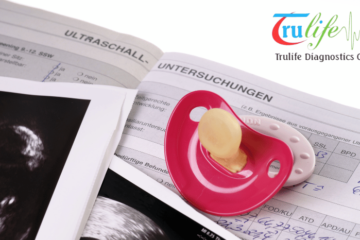Accurate ECG Testing with Trulife Diagnostic in Hyderabad: Your Guide to Heart Health

Trulife Diagnostic is a premier medical diagnostic center located in Hyderabad, renowned for its excellence in providing comprehensive heart health assessments. With a commitment to advanced diagnostic services, Trulife Diagnostic stands out in the medical field for its high-quality ECG testing. Equipped with cutting-edge technology and staffed by experienced healthcare professionals, Trulife Diagnostic ensures accurate and reliable results for every patient.
Advantages of Choosing Trulife Diagnostic

- Advanced ECG Technology: At Trulife Diagnostic, the ECG tests are conducted using the latest electrocardiogram technology. This advanced equipment captures detailed electrical activity of the heart, providing precise and reliable diagnostic results. The high-resolution ECG machines at Trulife Diagnostic enhance the accuracy of detecting subtle cardiac abnormalities, making it a leading choice for heart health diagnostics.
- Expert Medical Team: The medical professionals at Trulife Diagnostic are highly trained cardiologists and technicians with extensive experience in interpreting ECG results. Their expertise ensures that each ECG test is conducted meticulously, and the results are analyzed with the highest level of accuracy. The team’s proficiency in cardiology helps in diagnosing a wide range of heart conditions, from arrhythmias to ischemic heart disease.
- Comprehensive Diagnostic Services: Trulife Diagnostic offers a full spectrum of diagnostic services beyond ECG testing. This includes blood tests, imaging studies, and other cardiovascular assessments. By providing an integrated approach to heart health, Trulife Diagnostic makes it easier for patients to receive comprehensive care and follow-up in one location.
- Patient-Centric Approach: The center prioritizes patient comfort and convenience, offering a supportive environment throughout the diagnostic process. Trulife Diagnostic’s commitment to patient care is reflected in its streamlined appointment scheduling, detailed consultations, and clear communication of test results.
Understanding ECG Testing | Trulife Diagnostic

An Electrocardiogram (ECG) is a diagnostic tool used to measure and record the electrical activity of the heart over a period of time. The heart is essentially a complex electrical pump. It generates electrical impulses that trigger each heartbeat, and these impulses spread through the heart muscle in a specific pattern. An ECG captures these electrical impulses and represents them as a series of waves on a monitor or paper.
How It Works
- Electrodes Placement: During an ECG, small, sticky electrodes are attached to the skin on specific locations around the chest, arms, and legs. These electrodes detect the electrical signals produced by the heart.
- Signal Transmission: The electrodes are connected to an ECG machine, which amplifies the electrical signals and converts them into a graphical representation known as an ECG waveform.
- Waveform Representation: The resulting waveform is a visual depiction of the heart’s electrical activity. It typically includes several key components:
- P Wave: Represents the electrical impulse that travels through the atria (the heart’s upper chambers), leading to atrial contraction.
- QRS Complex: Reflects the electrical impulse as it travels through the ventricles (the heart’s lower chambers), causing ventricular contraction. This is the most prominent part of the ECG waveform.
- T Wave: Indicates the period when the ventricles are repolarizing, or recovering, after contraction.
Why is ECG Testing Important?
ECG testing is vital for various reasons, as it provides critical information about the heart’s condition and functionality:
- Detecting Arrhythmias: One of the primary uses of an ECG is to identify abnormal heart rhythms, or arrhythmias. These can range from benign to life-threatening. Conditions like atrial fibrillation, which causes the atria to contract irregularly, can be detected with an ECG. Identifying arrhythmias is crucial for preventing complications such as stroke or heart failure.
- Diagnosing Heart Attacks: An ECG can reveal changes in the heart’s electrical pattern that are indicative of a heart attack (myocardial infarction). When the heart muscle is damaged, as in the case of a heart attack, the electrical impulses are altered. ECG results can show patterns of ST-segment elevation or depression, which help diagnose the presence and severity of a heart attack.
- Evaluating Heart Health: For individuals with known heart disease or risk factors such as hypertension, diabetes, or high cholesterol, an ECG provides a way to monitor ongoing heart health. Regular ECGs can help track changes in heart function and detect issues early, allowing for timely intervention.
- Preoperative and Routine Assessments: Before certain surgical procedures, an ECG may be performed to assess the heart’s health and ensure it is functioning properly. This helps to identify any potential risks that could complicate the surgery. Additionally, routine ECGs are used for preventive health checks, especially in high-risk populations.
Types of ECG Tests
Different types of ECG tests are used to obtain specific information about the heart’s activity:
- Resting ECG: This is the most basic form of ECG testing, typically performed while the patient is lying down and at rest. It provides a snapshot of the heart’s electrical activity at a single point in time and is often used for initial assessments.
- Exercise ECG (Stress Test): Conducted while the patient exercises, usually on a treadmill or stationary bike, this test evaluates how the heart responds to physical stress. It helps to uncover issues that might not be visible during rest, such as exercise-induced arrhythmias or ischemia (reduced blood flow to the heart muscle).
- Holter Monitor: This is a portable ECG device worn by the patient for 24 to 48 hours. It continuously records the heart’s activity throughout the day and night, capturing data that might be missed in a single resting ECG. It is particularly useful for detecting intermittent arrhythmias or symptoms that occur sporadically.
- Event Recorder: Similar to a Holter monitor but used for a longer period, typically 2 to 4 weeks. The device records the heart’s electrical activity and allows patients to activate it when they experience symptoms, providing a detailed record of events that might be linked to their symptoms.
Interpreting ECG Results
The results from an ECG are interpreted by trained healthcare professionals who analyze the waveforms for any abnormalities or deviations from the normal pattern. Key aspects evaluated include:
- Heart Rate and Rhythm: Determining whether the heart rate is within normal limits and if the rhythm is regular or irregular.
- Electrical Axis: Assessing the direction of electrical impulses in the heart to identify possible issues with heart structure or function.
- Waveform Analysis: Checking the shape, duration, and intervals of the waveform components to detect abnormalities such as enlargement of heart chambers or evidence of ischemia.
An accurate interpretation of ECG results is essential for diagnosing and managing heart conditions effectively. The insights gained from an ECG can guide treatment decisions, ranging from lifestyle changes and medication adjustments to more invasive interventions if necessary.
Understanding ECG testing empowers patients to better comprehend their heart health and the importance of regular monitoring. This knowledge helps in making informed decisions about their care and contributes to maintaining optimal cardiovascular health.
.
Take Charge of Your Heart Health Today | Trulfie Diagnostic
Understanding your heart health is crucial for a long, healthy life. At Trulife Diagnostic in Hyderabad, we offer modern ECG testing to help you stay on top of your cardiovascular health. Whether you’re experiencing symptoms or just need a routine check-up, our advanced technology and expert team are here to provide accurate, reliable results.
Don’t wait for symptoms to worsen—schedule your ECG test with Trulife Diagnostic today! Contact us at [phone number] or [email address] to book your appointment or learn more about our comprehensive heart health services. Your heart health is our priority, and we’re here to support you every step of the way.
Stay proactive. Stay healthy. Choose Trulife Diagnostic.



